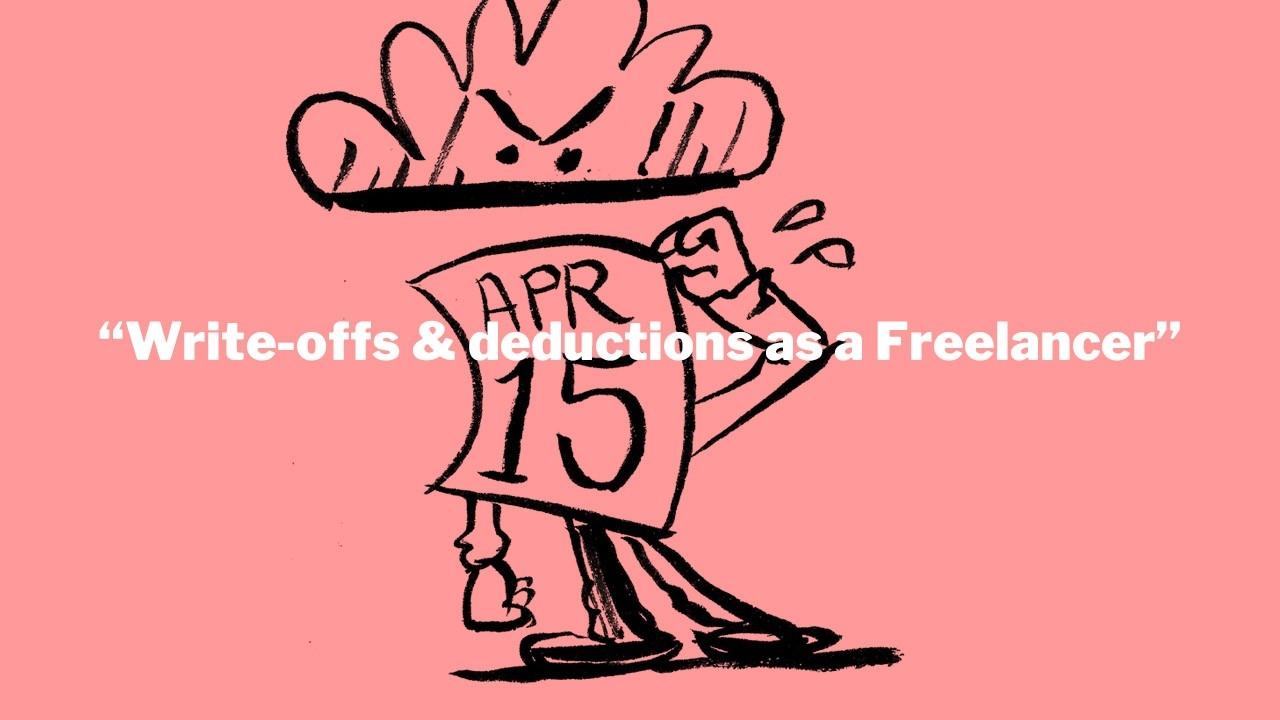
What Can a Freelancer Write-off Their Taxes?
Freelancing opens up lots of wonderful doors and opportunities, including being able to write off lots of things that full-timers can't. Your tax rate depends on what you make and where you live, but most freelancers pay in the neighborhood of 35% of their income in taxes.
If you are Freelance you can probably deduct these things from your taxes and make more money!
So that means anything you can deduct is essentially 35% off. Which can add up, especially when you consider all the things freelancers can deduct.
Disclaimer:
We're not accountants. But we have accountants.
And, as a freelancer, you should have one too. After all, their fee is a tax deduction. Your accountant will tell you what you can and can't deduct, but these are deductions we take so you can probably take them too.
Writing off your computer.
Assuming you need it to do your job, which of course you do, your computer is a business expense. So is that really big monitor you need for designing or editing, the printer you need for printing out stuff, any programs you need to buy, the nice headphones you listen to music on that helps you work better and even the desk you set it on top of and the power strip you plug it into. So if that's stuff adds up to say... $2000, and you pay 35% in taxes, you will reduce your tax bill by $700!
Writing off your phone. And your phone plan.
Again, hard to stay in touch with clients without one. Your accountant might suggest you take the entire expense, or a percentage based on how much you use your phone for business versus pleasure. But even so, work calls and emails plus social media (which you need to keep up with for inspiration and networking, right?) is considerably more than Words with Friends and texting friends, right?
Same goes for a tablet even an Apple Watch if you have these things and you're using these things for anything work related.
Obviously you can write off your office
If you have an office out of your house the entire rent plus utilities is obviously a deduction. But even if you have a home office or even part of your house that's used for work or even storing work stuff, that's a deduction too.
If you have a home office break out the tape measure and figure out what percentage of the total square footage of your home comprises your home office or work space. You can then deduct that percentage of rent or mortgage plus utilities and home repairs. That's right. If your home office is say, 17% of your house, and you paint your house or put on a new roof, you can deduct 17% of those costs.
If you don't have an office office or a home office, create one. Dedicate part of your living room or bedroom to being your office. Dedicate a closet to work stuff. And deduct away.
Oh, the chair you bought for the office, and the curtains and the office supplies and the plants? Yeah, all full deductions.
Maybe less obvious: Media
You probably have a Netflix account and subscribe to a newspaper or two online and you buy books related to what you do professionally. Heck you might even have a cable account and subscribe to a few magazines as well. If you need these things to because you need to stay culturally relevant or up on current design trends or just draw general inspiration from absorbing all this media, then you can deduct it!
Anything you do to promote or better your career
Do you have a website, with domain name and hosting you pay for?
A LinkedIn Pro subscription?
Business cards?
Have you ever pulled a stunt to get noticed by a company or recruiter?
That's all deductible.
So is taking a class or workshop if you're taking it because it could add or improve the skills you use to make money.
Are there more deductions?
Yes!
In fact, there's one very, very few freelancers take and many accountants haven't even thought to consider. But ours have and we'd love to share it with you.
Travel
Obviously if you travel for work, it's an expense. But if you travel for fun you might be able to take a deduction. Let's say you're an illustrator or art director and you visit New York City, and you spend your days going to museum's getting inspired. Or you have a tourism client and you travel there for fun, but you learn more about what makes it a great place to visit. Ask your accountant if you can deduct all or part of those trips as work inspirations trips.
Oh, and just so we're on the same page, travel is how you got there, where you stayed, how you got around and what you ate. You keep your receipts and add them all up, or you can just track airfare (or how ever you got there) and use the federal per diem travel rates which can sometimes work out even better depending on where you're starting and how much you're spending on food and drink.
Want to learn more about taxes and finances for freelances? We'd love to send you a few more tips.
"Mt. Freelance emails are so good I don't delete them."
— Everyone

Get FREELANCE tips and tricks that make you more money and save you time.
Plus reminders each time we release a new podcast episode.


